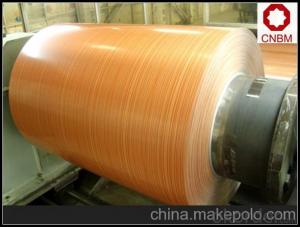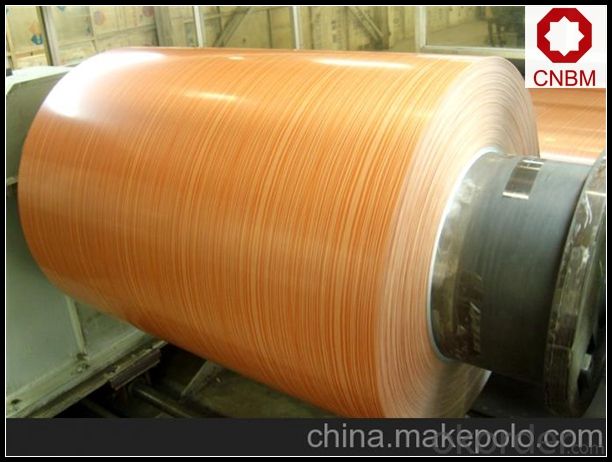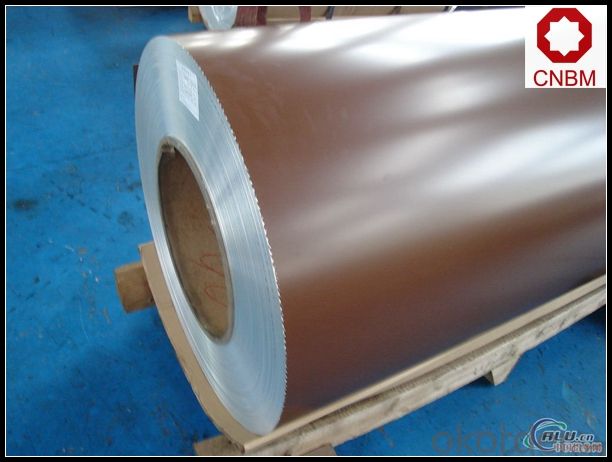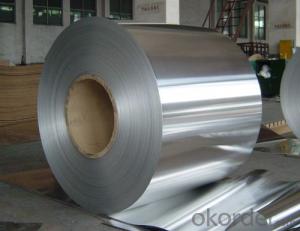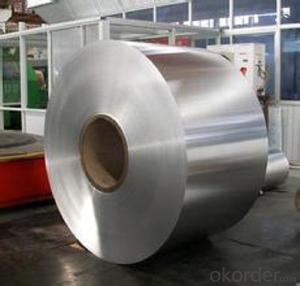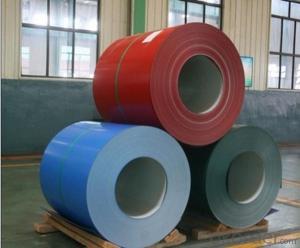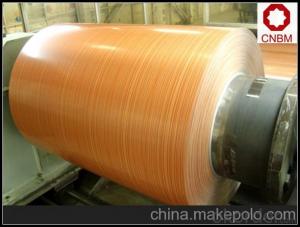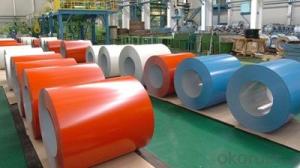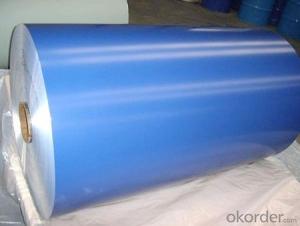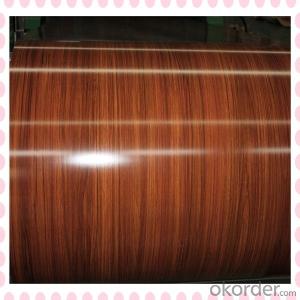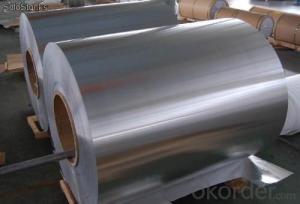Pure Aluminum Coil - Wooden Pattern Roll Coated Aluminum Coil AA1100
- Loading Port:
- Shanghai
- Payment Terms:
- TT OR LC
- Min Order Qty:
- 5 m.t.
- Supply Capability:
- 10000 m.t./month
OKorder Service Pledge
OKorder Financial Service
You Might Also Like
Specification
1. Specification of Wooden Pattern Roll Coated Aluminum Coil AA1100
Alloy: 1050, 1060, 1100, 3003, 3004, 3005, 3105, 5005, 5052, 5083, 5754
2) Temper: Various status
3) Thickness: 0.3-150mm
4) Width: 300-1950mm
5) Length: Under9500mm/ Coil
6) Weight: 2.5-5.0 tons per coil
7) Dimensions and weight can be produced according to clients' specifications.
8) Inner Diameter: 505mm, 605mm
9) Packing: Export standard, wooden pallet.
10) Delivery time: 20 days
11) Minimum order quantity: 5 tons per size.
12) The term of payment: T/T, irrevocable L/C at sight.
13) Surface: Bright
14)Origin: China
2. Application of Wooden Pattern Roll Coated Aluminum Coil AA1100
(1).Interior: wall cladding, ceilings, bathrooms, kitchens and balconies, shutters, doors...
(2).Exterior: wall cladding, facades, roofing, canopies, tunnels,column covers , renovations...
(3).Advertisement: display platforms, signboards, fascia, shop fronts...
3. Feature of Wooden Pattern Roll Coated Aluminum Coil AA1100
*Such coil is specially designed to replace aluminum ingot, due to the high export tax of aluminum ingot, the coil has better price than ingot.
*This type of coil can fit customer's remelting furnace just like ingot, no need to make any change to the production line that was previously used for ingot. The standard coil size and weight is very suitable for the feed gate of furnace.
*This type of coil causes less material wastage than ingot when remelted.
*Our coil is made directly from ore, no need to go though the ingot making process, quality is much better than other suppliers who use ingot scrap to make coil.
Be free from Oil Stain, Dent, Inclusion, Scratches, Stain, Oxide Dicoloration, Breaks, Corrosion, Roll Marks, Dirt Streaks and other defect which will interfere with use
4. Certificate:
SGS and ROHS(if client request, paid by client), MTC(plant provided), Certificate of Origin(FORM A, FORM E, CO), Bureau Veritas and SGS (if client request, paid by client), CIQS certificate
5. Image of Wooden Pattern Roll Coated Aluminum Coil AA1100
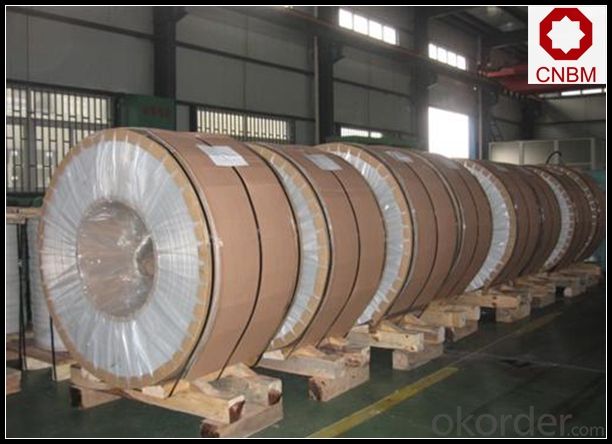
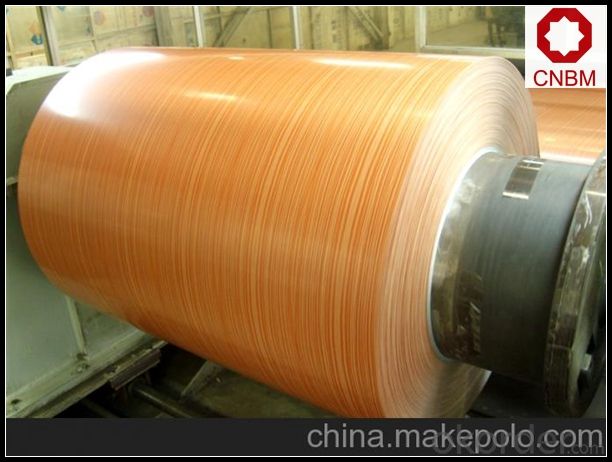
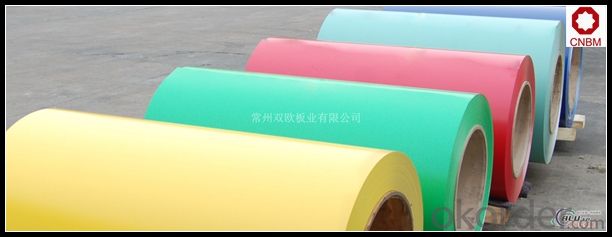
6. Package and shipping of Wooden Pattern Roll Coated Aluminum Coil AA1100
eye to wall
eye to the wall
with wood pallet (wooded case also available)
7. FAQ
1) What is the delivery time?
Dpends on actual order, around 20 to 35 days
2)What is the QC system:
We have QC staff of 20 persons and advanced equipment, each production is with MTC traced from Aluminum ingot lot.
3) What market do you mainly sell to?
Australia, America, Asia, Middle East, Western Europe, Africa etc
- Q: Can aluminum coils be used in food processing industries?
- Yes, aluminum coils can be used in food processing industries. Aluminum is a widely used material in food processing due to its numerous advantageous properties. It is lightweight, flexible, and has excellent thermal conductivity. These qualities make aluminum coils ideal for applications such as refrigeration, heat exchangers, and ovens in the food processing industry. Additionally, aluminum is non-toxic, corrosion-resistant, and does not impart any odor or taste to the food products being processed. This makes it a safe and hygienic choice for food processing equipment. Furthermore, aluminum coils are easy to clean and maintain, which is crucial in maintaining the highest standards of cleanliness and food safety. Overall, aluminum coils are widely accepted and used in food processing industries due to their superior performance and suitability for food-related applications.
- Q: What are some normal everyday products made from aluminum that I can use to recycle?
- cool drink cans.
- Q: What are the disadvantages of using aluminum coils?
- There are several disadvantages of using aluminum coils in various applications. Firstly, aluminum coils tend to have a lower heat transfer coefficient compared to other materials like copper. This means that they may not be as efficient in transferring heat, which can negatively impact the performance and energy efficiency of cooling or heating systems. Additionally, aluminum coils are more prone to corrosion compared to copper coils. This is especially true in environments with high humidity or exposure to harsh chemicals. Corrosion can lead to leaks in the coil, reducing its lifespan and potentially causing damage to the system. Another disadvantage of aluminum coils is their relatively lower tensile strength compared to other materials. This means that they may be more susceptible to damage or failure under excessive pressure or stress. This can be a concern in applications where the coils are subject to high pressure or frequent movement. Furthermore, aluminum coils can be more expensive compared to other materials like copper. While aluminum itself is a cheaper material, the manufacturing processes involved in producing aluminum coils and the additional coatings required to improve its performance can increase the overall cost. Lastly, aluminum coils may require more maintenance and cleaning compared to other materials. Due to their tendency to accumulate dust, dirt, and debris more easily, regular cleaning is necessary to maintain their performance and prevent clogging or blockages. Overall, while aluminum coils have their advantages such as being lightweight and resistant to corrosion in certain environments, it is important to consider these disadvantages when choosing the appropriate coil material for specific applications.
- Q: Are there any limitations on the embossing of aluminum coils?
- Yes, there are some limitations on the embossing of aluminum coils. One limitation is the thickness of the aluminum coil. Embossing is typically more difficult on thicker coils, as they require more force to achieve the desired pattern. Additionally, the embossing process may cause the coil to stretch or distort, particularly if the thickness is already close to the upper limit for embossing. Another limitation is the complexity of the embossing design. Intricate or detailed patterns may be more challenging to achieve on aluminum coils, especially if they have a lower gauge or thickness. The embossing process may not be able to accurately replicate intricate designs, resulting in a less defined or distorted pattern. The size of the aluminum coil can also pose a limitation. If the coil is too large, it may be difficult to emboss evenly across the entire surface. This can result in inconsistencies in the embossed pattern or uneven pressure being applied to the coil during the embossing process. Lastly, the type and quality of the aluminum can limit the embossing capabilities. Different alloys or grades of aluminum may have varying levels of malleability and resistance to embossing. Some alloys may be more prone to cracking or deforming during the embossing process, limiting the types of patterns that can be achieved. Overall, while embossing can be done on aluminum coils, the thickness, complexity of the design, size, and quality of the aluminum can all impact the limitations of the embossing process. It is important to consider these factors when embossing aluminum coils to ensure the desired results are achieved.
- Q: How do aluminum coils perform in cryogenic environments?
- Due to their low thermal expansion coefficient and high thermal conductivity, aluminum coils have excellent performance in cryogenic environments. When subjected to extremely low temperatures, aluminum coils display minimal contraction and expansion, making them suitable for cryogenic applications. The coils' low thermal expansion coefficient ensures that they maintain their structural integrity and do not deform or crack when exposed to extreme temperature fluctuations. Moreover, aluminum's high thermal conductivity facilitates efficient heat transfer, enabling the coils to effectively dissipate excess heat and maintain a stable temperature in the cryogenic environment. All in all, aluminum coils are a dependable choice for use in cryogenic environments and can effectively withstand the challenges presented by extremely low temperatures.
- Q: Can aluminum coils be used in electrical wiring applications?
- Indeed, aluminum coils possess the capability to be employed in electrical wiring applications. For numerous years, aluminum has served as a conductor in electrical wiring, particularly in residential and commercial structures. As a lightweight and economical substitute for copper, it has been widely embraced. Aluminum coils find common usage in power distribution, transformers, and motors. Nevertheless, it is crucial to acknowledge that aluminum exhibits contrasting electrical and mechanical properties in comparison to copper. As a result, meticulous installation techniques and connectors exclusively crafted for aluminum wiring must be employed to guarantee both safety and efficiency.
- Q: Are aluminum coils suitable for curtain wall systems?
- Yes, aluminum coils are highly suitable for curtain wall systems. Aluminum is a lightweight and durable material that offers numerous benefits for curtain wall applications. Firstly, aluminum coils are corrosion-resistant, ensuring the longevity and durability of the curtain wall system. This makes them ideal for exterior applications where the system is exposed to various weather conditions. Additionally, aluminum does not rust, which is a significant advantage over other materials like steel. Furthermore, aluminum coils can be easily extruded into various shapes and sizes, allowing for flexibility and creativity in curtain wall design. This enables architects and designers to create visually appealing and unique structures. Moreover, aluminum is a highly sustainable material. It is 100% recyclable, which means that it can be reused without any loss in quality. This makes aluminum coils an eco-friendly choice for curtain wall systems, aligning with the growing demand for sustainable building materials. Additionally, aluminum is a good conductor of heat and electricity, which can contribute to energy efficiency in curtain wall systems. By using thermal breaks and incorporating insulation, aluminum curtain walls can effectively regulate temperature and reduce energy consumption, leading to cost savings in the long run. Overall, aluminum coils are an excellent choice for curtain wall systems due to their corrosion resistance, versatility, sustainability, and energy efficiency.
- Q: How do aluminum coils contribute to noise reduction in buildings?
- The unique properties and installation techniques of aluminum coils can contribute to noise reduction in buildings. To begin, aluminum's density and ability to absorb and dampen sound waves make it a highly efficient sound insulator. When used as coil insulation, aluminum effectively blocks and reduces airborne noise transmission, minimizing the impact of external sounds on the building's interior. In addition to aluminum's inherent sound insulation properties, the installation of aluminum coils in buildings can further enhance noise reduction. By strategically placing the coils in areas where noise transmission is likely to occur, such as HVAC systems and ductwork, potential gaps or openings that could allow sound to travel are eliminated when tightly sealed with aluminum coils. Furthermore, aluminum coils act as a barrier to vibration and resonance noises. They can be installed around mechanical equipment or structural elements prone to vibration, effectively dampening these vibrations and preventing them from propagating throughout the building. This is particularly important in reducing low-frequency noises, which are typically more difficult to control and can significantly impact the comfort and productivity of occupants. Moreover, aluminum coils offer durability and longevity, ensuring their effectiveness in noise reduction over a long period. They are resistant to corrosion, moisture, and other environmental factors, maintaining their sound-insulating properties and preventing sound leakage. In conclusion, by combining the sound insulation properties of aluminum with strategic installation techniques, such as sealing gaps and dampening vibrations, aluminum coils play a vital role in reducing noise transmission in buildings. Their ability to absorb, block, and dampen sound waves makes them an effective solution for creating quieter and more comfortable indoor environments.
- Q: Is it possible to utilize a grinder for cutting aluminum coils?
- <p>Yes, you can use a grinder to cut aluminum coils, but it's important to use the right type of grinder and accessories. An angle grinder with a cutting wheel or a metal cutting disc is suitable for this task. Ensure the grinder is equipped with a safety guard and that you're wearing appropriate safety gear, such as goggles and gloves. Be cautious as aluminum can be slippery and the grinder can generate a lot of heat, which may require frequent cooling to prevent the disc from burning out. It's also advisable to work in a well-ventilated area due to the fine particles produced during cutting.</p>
- Q: Is it possible to use a saw to cut aluminum coils?
- <p>Yes, aluminum coils can be cut with a saw, but it's important to use the right type of saw. A hacksaw or a fine-toothed metal cutting saw is suitable for cutting aluminum. Lubrication is also crucial to reduce friction and prevent the saw blade from overheating. When cutting aluminum, it's advisable to use a cutting fluid or a light machine oil to keep the blade cool and ensure a clean, smooth cut. Always follow safety precautions and wear appropriate protective gear when cutting metal.</p>
Send your message to us
Pure Aluminum Coil - Wooden Pattern Roll Coated Aluminum Coil AA1100
- Loading Port:
- Shanghai
- Payment Terms:
- TT OR LC
- Min Order Qty:
- 5 m.t.
- Supply Capability:
- 10000 m.t./month
OKorder Service Pledge
OKorder Financial Service
Similar products
Hot products
Hot Searches
Related keywords
